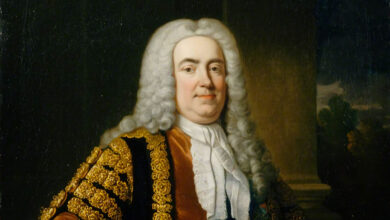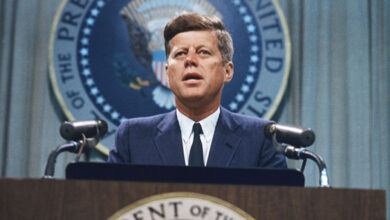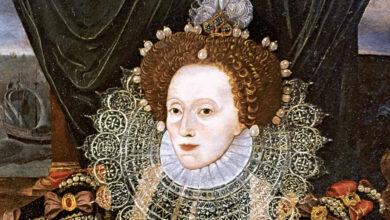“No man has a good enough memory to be a successful liar.” – Abraham Lincoln
Podcast: Play in new window | Download
Subscribe: Spotify | Amazon Music | Youtube Music | RSS
Abraham Lincoln was a fairly simple man, and with the hindsight of history, some have judged him unfairly, attempting to hold a 19th-century man to 21st century standards. However, when viewed as a man of his times, what he said and did was revolutionary, and unlike other historical figures, Abraham Lincoln’s story is one that has continued to shine for generations. A man who was born into poverty in a one-room log cabin deep in the Kentucky wilderness rose to become one of the most influential presidents in American history.
Abraham Lincoln was born to Thomas and Nancy Lincoln in that small Kentucky log cabin on 12 February 1809. Frontier life was bitter and back-breaking work. Many did not survive, including Nancy Lincoln who died in 1818 at the relatively young age of only 34. Abraham was not best suited to this sort of life, with his lean, gangly frame, and a strong dislike of physical work, preferring to read and write poetry instead. This attitude led many of those in his life at the time to believed that Lincoln was simply lazy and that he would never amount to much. Abraham Lincoln, though, had other ideas. Far removed from civilization, Lincoln’s formal schooling was likely less than a year in total, so he became a voracious reader, devouring such classics as Pilgrim’s Progress and Benjamin Franklin’s autobiography. He also spent many hours studying the Bible. The Lincoln family did not stay in Kentucky, and in 1830 moved to Illinois where in December 1839 Abraham would meet Mary Todd, a well-educated young woman from a large, wealthy slave-holding Kentucky family. They married on 4 November 1842 and the couple went on to have four sons together.
Throughout the first half of the 1800s, the United States was embroiled in a severe political and moral struggle over the issue of slavery. A generation before, the founding fathers had failed to address the issue of slavery as they felt at the time that national unity was far more important, and so they left provisions for addressing the issue of slavery for future politicians to grapple with. Unfortunately, instead, the rural agrarian culture of the South became more reliant on slavery and this led not only to the issue not being resolved, but it became a more entrenched way of life and its continuance was fought for by Southern Democrats both in the House and in the Senate. As new states were being admitted to the Union, the most contentious issue of all was always whether a state would be a free state like Illinois where slavery was illegal or a slave-holding state like Kentucky.
Throughout the 1840s and 1850s, Abraham Lincoln would have a variety of jobs in order to try and bring in some sort of income. At various points, he was a shop owner, the head of a local militia, a fairly successful lawyer, and an unsuccessful politician coming in nearly dead last when he ran for the Illinois General Assembly. However, his fortunes began to change as people noted his quick wit, his towering physical presence, and his homely way of speaking. His recognition grew immensely when he faced off against the well-known debater and orator Stephen Douglas in what became known as the Lincoln-Douglas debates. Lincoln, who had been a nobody, was widely considered to have trounced a supposedly superior debater with his intelligence and wit.
Abraham Lincoln’s growing popularity caused a new political party to back him as their candidate for the presidency with its biggest platform item being the absolute end of slavery. The Republican anti-slavery party quickly gained huge momentum in the North where most of the abolitionists were located. The campaigning was fierce and throughout the country turmoil and unrest were starting to spread due to this ever growing moral crisis.
Lincoln was up all night as the election results started to be telegraphed in. On 6 November 1860, stress and anxiety eventually turned to excitement when it became clear that the Republican Party, and therefore he, had won the election. However, with the winning of an election, Abraham Lincoln lost half of the country. The southern states who unanimously voted against Lincoln felt their economic prosperity, their culture, and their way of life were under threat by this new president, but despite the fact that every single southern state voted against him, Abraham Lincoln still managed to carry the day. The southern states interpreted the election results to mean that their voice in the republic meant nothing. One by one, the slave states started to leave the union under the belief that since they had joined of their own accord in order to fight the revolutionary war, they held the right at any time to reverse that decision, and leave.
With the defection of the southern states underway, both sides began raising armies for the inevitable conflict to come. That conflict was Abraham Lincoln’s greatest trial and the one by which future historians would measure his success as a president. The Civil War waged for five years between 1861 and 1865 and during this period, over 600,000 American soldiers lost their lives. The issue of slavery, however, had not gone away but Lincoln’s views had evolved on the matter. Early in the war, Lincoln is reported to have said that if he could save the union and keep slavery he would, although he also said that if he could end slavery and keep the union he would. Slavery wasn’t the driving issue that Lincoln was trying to address at this point in his career. The issue was a divided nation.
Abraham Lincoln’s views on slavery changed as his presidency evolved and he not only saw slavery as a part of the crisis but as its main cause, and after the successful Union forces defeated the Confederates at the Battle of Gettysburg, Lincoln issued the Emancipation Proclamation which freed the slaves in the whole of the United States and, on paper at least, declared freedom for all slaves in the southern states as well. However, this proclamation would mean nothing if the war could not be won.
After four years of conflict, the mechanized and industrialized northern armies finally, with capable leadership in the hands of Ulysses S. Grant and William T. Sherman managed to successfully and utterly defeat the southern states, a victory which compelled Confederate general Robert E. Lee to surrender the last major Southern Army at Appomattox Court House in 1865. Although Lincoln had issued statements speaking of reconciliation, brotherhood, and his desire to support the south in rebuilding, he would never live to see his vision come to fruition as while he was watching a play called Our American Cousin at Ford’s Theatre in Washington D.C. he was shot at point-blank range in the back of the head by actor and Confederate spy John Wilkes Booth at 10:13 pm on 14 April 1865. President Abraham Lincoln died at 7:22 the following morning. He was succeeded by his vice president, Andrew Johnson, who was sworn in as the 17th president of the United States only three hours later.
The assassination of a beloved wartime president and one whom the nation felt would guide them safely through years of peace and rebuilding turned Abraham Lincoln into a martyr for his country. Although Abraham Lincoln’s presidency was not without its controversies, despite it all he managed to steer a troubled nation through troubled times, and although he did not live to create the peace he had envisioned, he would continue to be an inspiration for countless generations of Americans and would forever be known as the great emancipator.
Podcast: Play in new window | Download
Subscribe: Spotify | Amazon Music | Youtube Music | RSS




